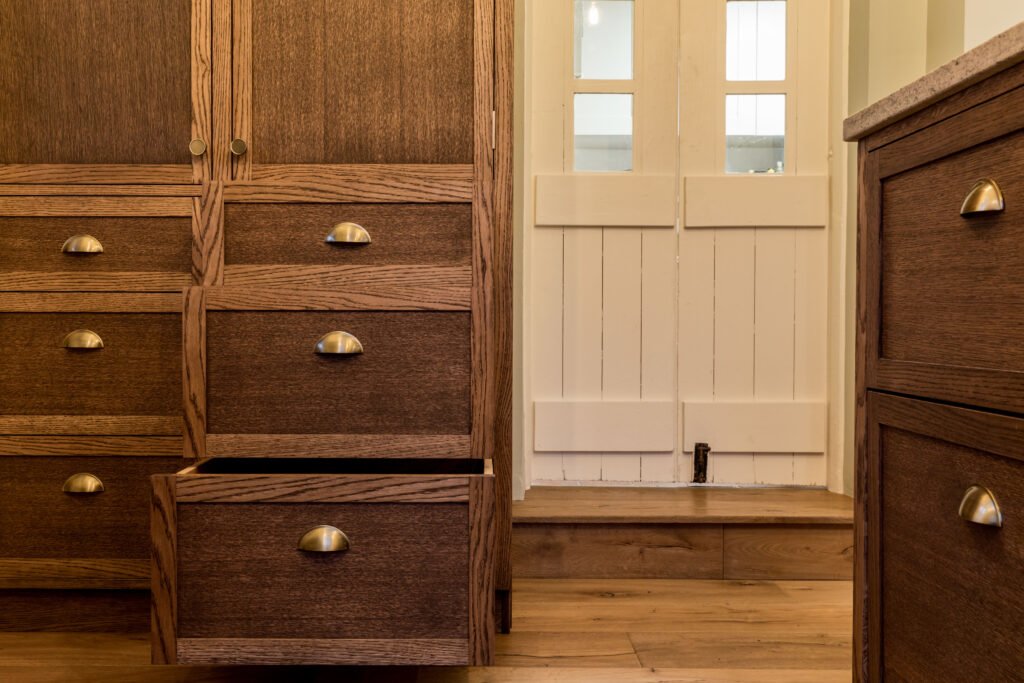Sustainability should be an essential part of any business plan. With the ongoing climate emergency, woodworkers and furniture makers should be joining in the collective effort to go greener – but sustainability is also about creating a business that will last while benefitting its community, staff and customers.
Jamie Wemyss is a former Chippendale School student, and since graduating he has created JMW Furniture, a successful business with sustainability at its heart. We spoke to Jamie to find out how aspiring woodworkers and furniture business owners can craft the most sustainable business model.
Benefits of sustainability
Jamie explains: “Put simply, knowing you are working towards creating a sustainable business feels good – you can rest assured that you are making an effort to do what is right for future generations.”
“Plus, it’s very interesting to research sustainability so that your business decisions can be better informed. It also allows you have to have a stance and craft a unique selling point for your business. It provides you with content to write about and have an opinion on, potentially opening up opportunities for you and your business to be featured in media.”
He also highlights the commercial benefits of sustainability, “customers are also increasingly environmentally aware and love to see that your business is striving to reduce its carbon footprint, so it really helps to make your products more attractive to customers.”
Sourcing materials
Sustainable timber can be quite easy to source – Jamie explains: “Depending on your business model, Forest Stewardship Council (FSC) approved timbers can be bought almost anywhere. When I lived in Bristol there were three large timber merchants in one city. Timbmet and Lathams are all reliable and good suppliers and nationwide.”
“However, if you want to buy British or Grown in Britain accredited timber (GiB), then you can acquire the timber from Vasterns, English Woodland and Whitney Sawmills in the south to name a few. I hear there are some goodies in Scotland too which I look forward to getting to know like Paterson Timber and Scottish Wood.”
Jamie also notes the option of processing your own timber: “You can buy fallen lumber from a landlord, employ a mobile sawmiller to process it for you or even invest in an Alaskan mill (chainsaw mill) and do it yourself, but transport is complicated and expensive.
It is a lot easier and probably cheaper, in the long run, to just buy from a merchant, but you’ll never get the provenance like you would milling your own wood. Unfortunately, there are only so many hours in the day and you can’t do everything, nor can you change the world yourself.”
A natural process
Sustainability isn’t just about materials and energy – Jamie notes that: “It’s about creating a sustainable business that can support your community, contribute to the economy and bring pleasure to those who work there.”
“To me, it means creating a legacy – something that I can pass on to my children, whether that be a business or a way of life.”
Aside from sourcing sustainable materials, Jamie explains other pathways to sustainability: “Running a workshop on green energy would be my first step towards creating a green workplace. There is an increasing number of green energy suppliers, or you could invest in a biomass heating system. There are also all sorts of bio glues, bio-resins and eco-board that come as alternatives to materials like plywood and MDF.”
“We must feel like we are ethically and morally doing the right thing in our working practice, and as long as we feel we are taking the right steps to better our children’s future, then that is all that matters.”
Overcoming challenges
Of course, there are challenges that come with being sustainable. Jamie explains: “If you want to buy local timbers, they tend to be waney-edged and that comes with lots of waste, so it makes the cost of materials very high. It also makes you question if you can justify that much waste, however, my offcuts keep the family warm in the winter – there is no better kindling!”
“The furniture industry is so competitive with thousands of companies around Europe and depending on your distribution channel it’s hard to be competitive on price whilst maintaining the highest quality.”
“The challenges in business are everywhere. But overall, it is about finding an ethos and creating products that you believe in and working hard to transfer that passion into the homes and hands of like-minded souls.”
Jamie’s top 5 sustainability tips
- Buy local – whether that’s timber, food, clothes, or anything else!
- Run your workshop with green energy
- Learn and read about sustainability, so that it becomes more than a noun or an adjective
- Design and make furniture that will last for a long time and consider the circular economy
- Talk about it with friends and clients.
—
Many thanks to Jamie Wemyss of JMW Furniture for his contribution to this blog.
At the Chippendale International School of Furniture, students are encouraged to take a sustainable approach to setting up their businesses. They are shown how to create a business with long-term value and to consider the ecological, social and economic impact of their overall strategy. Find out more about our Professional Course here or get in touch to find out more.
